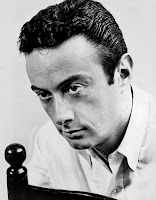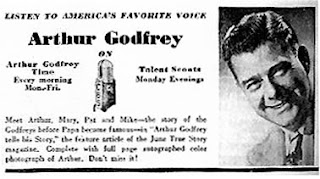First part
Lenny
Bruce es un completo desconocido para los salteños,
aunque apareció en algunas películas. Lenny
fue comediante, actor, escritor y mucho más. Para muchos representó la lucha
del hombre solitario contra el sistema perverso, que trataba de quebrar la
voluntad del individuo para que vuelva al rebaño, al montón. Tal vez nació
demasiado pronto, y hoy sus palabras pasarían desapercibidas, o quizás sus
dichos fueron los que abrieron las mentes de las personas, a buscar más libertad.
Vaya uno a saber, lo cierto es que Bruce
fue perseguido por la justicia por “decir malas palabras”, en un país donde a
la vuelta de la esquina se hacía pornografía, y hasta se colgaba a la gente por
ser de otro color. Fue prohibido en la TV, aunque fue apoyado por grandes
personalidades del espectáculo. ¿Luchó por el derecho a la libre expresión?
Creo que sí, porque aunque no me gusten las malas palabras, un artista puede
decirlas dentro de un teatro o café con concert, donde no hay menores ni puede
ofender a nadie. El texto está inglés (y
la segunda parte viene en castellano.)
Tenemos vocabulario: stint, hopefuls, ad-libs, impressions y rants; y
para los que quieren saber más están: George Pataki y
Broadcast Standards and Practices. Aquí comienza: Lenny
Bruce, genio y figura
He was renowned
for his open, free-style and critical form of comedy which integrated satire,
politics, religion, sex, and vulgarity…
… He found it
difficult to differentiate himself from the thousands of other show business
hopefuls…
Branded a
"sick comic", Bruce was essentially blacklisted from television…
Pildoritas
Leonard Alfred
Schneider (October 13, 1925 – August 3, 1966), better known by his stage name Lenny Bruce, was an American stand-up
comedian, social critic, and satirist. He was renowned for his open, free-style
and critical form of comedy which integrated satire, politics, religion, sex,
and vulgarity. His 1964 conviction in an obscenity trial was followed by a
posthumous pardon, the first in the history of New York State, by then-Governor
George Pataki in 2003.
 |
| Lenny Bruce, 1960 |
Lenny Bruce was born in a Jewish family in Mineola, New York. His parents divorced before he turned 10, and Lenny lived with various relatives over the
next decade. Bruce's mother, Sally Marr, was a stage performer.
After spending
time working on a farm, Bruce joined
the United States Navy at the age of 16 in 1942, and saw active duty during World War II fighting in Northern Africa and Italy.
After a short stint in California spent living with his father, Bruce settled in New York
City, hoping to establish himself as a comedian. However, he found it
difficult to differentiate himself from the thousands of other show business hopefuls who populated the city. One
locale where they congregated was Hanson's,
the diner where Bruce first met the
comedian Joe Ancis, who had a
profound influence on his approach to comedy.
 |
| Godfrey Talent |
Lenny took the
stage as "Lenny Marsalle" one evening at the Victory Club, as a stand-in
master of ceremonies for one of his mother's shows. His ad-libs earned him some laughs. Soon afterward, in 1947, just after
changing his last name to Bruce, he
earned $12 and a free spaghetti dinner for his first stand-up performance in Brooklyn. He was later a guest on the Arthur Godfrey's Talent Scouts radio program. Lenny did a bit inspired by Sid
Caesar, "The Bavarian Mimic", featuring impressions of American movie stars.
Bruce's early comedy career included writing the screenplays for Dance Hall
Racket in 1953, Dream Follies in 1954, and The Rocket Man, in 1954.
In The Slate Brothers nightclub, Bruce was fired the first night for what
Variety headlined as "blue
material"; this led to the theme of Bruce's
first solo album on Fantasy Records, The Sick Humor of Lenny Bruce.
Bruce released a total of four albums of original material on Berkeley-based Fantasy Records, with rants, comic routines, and satirical
interviews on the themes that made him famous: jazz, moral philosophy,
politics, patriotism, religion,
law, race, abortion, drugs, the Ku
Klux Klan, and Jewishness.
Branded a
"sick comic", Bruce was
essentially blacklisted from television, and when he did appear thanks to
sympathetic fans like Steve Allen or Hugh Hefner, it was with great
concessions to Broadcast Standards and Practices.
On February 3,
1961, in the midst of a severe blizzard, he gave a famous performance at Carnegie Hall in New York.
“Lenny worshiped the gods of Spontaneity,
Candor and Free Association. He fancied himself an oral jazzman. His ideal was
to walk out there like Charlie Parker, take that mike in his hand like a horn
and blow, blow, blow everything that came into his head just as it came into
his head with nothing censored, nothing translated, nothing mediated, until he
was pure mind, pure head sending out brainwaves like radio waves into the heads
of every man and woman seated in that vast hall…” Albert Goldman
In 1951, Bruce met Honey Harlow, a stripper from Manila,
Arkansas. They were married that same
year, and Bruce was determined she
end her work as a stripper… (Continuará)
Vocabulario
Stint: duration, stretch.
Hopefuls: aspirants, wannabes.
Ad-libs: comments, remarks.
Impressions: personations, portrayals.
Rants: grandiloquence, grandiosity.
Para saber
George
Elmer Pataki (/pəˈtɑːki/;
born June 24, 1945) is an American lawyer and Republican politician who served
as the 53rd Governor of New York (1995–2006). In 1994, Pataki ran for Governor
of New York against three-term incumbent Mario Cuomo, defeating him by a margin
of more than three points as part of the Republican Revolution of 1994.
Broadcast
Standards and Practices:
In the United States, Standards and Practices (also referred to as Broadcast
Standards and Practices) is the name traditionally given to the department at a
television network which is responsible for the moral, ethical, and legal
implications of the program that network airs. Standards and Practices also
ensures fairness on televised game shows, in which they are the adjunct to the
judges at the production company level. They also have the power to reprimand
and to recommend the termination of television network stars and employees for
violations of standards and practices.
Artículos
relacionados
Fuentes
Lenny Bruce, Wikipedia
No comments:
Post a Comment